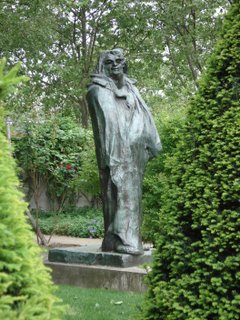Balzac

Having seen Rodin's studies of Balzac, rendered in the nude, yesterday at the Musée Rodin -- well, one is rather grateful that the version of Rodin's monument that finally saw the light of day hid the fat fellow in a massive cloak (see left).
Honore de Balzac was born on this day in 1799 in Tours, France, the son of a peasant who had become successful following the French Revolution. He followed the wishes of his parents and enrolled in the Sorbonne to study law at 17. Having obtained his license to practice three years later, he convinced his parents to give him one year to pursue his ambition to be a writer. Living in a bare attic in Paris on a minimal allowance from his parents, Balzac had enough self-discipline to complete a dreadful tragedy before turning to writing the 18th century French equivalent of pulp novels, mostly under pseudonyms, in order to achieve financial independence.
In 1822, he began an affair with a woman 22 years his senior, Madame de Berny, who was to give him encouragement and lessons in tact. Eventually the affair subsided into friendship, but throughout his life Balzac seemed to pursue older women who had been disappointed in love, and who would make few demands on his time. He was not particularly handsome: only 5' 2" tall, he was stocky and had an enormous head, and usually appeared disheveled, too engrossed in his work to care how he looked. Rodin brilliantly captures his roughness.
In 1825 he interrupted his writing to pursue a publishing business, which ultimately crippled him financially for years. Out of the ashes of his foray into business came his plan for a 150-volume cycle of novels called the Human Comedy, a densely interconnected fictional study of every level of French society -- named, allusively, after Dante's similarly encyclopedic 14th century Divine Comedy. Beginning with his first successful novel, The Chouans (1829), Balzac wrote over 4 million words toward his plan. Imbued with irony and a strong sense of realism, the works of the Human Comedy reflected Balzac's view that the forces of nature make happy endings impossible, but at the same time, readers could enjoy Balzac's work for pure escapism, or for his superior powers of observation.
The novels also stand quite well as individual works, notable among them: The Magic Skin (1830, a Faustian tale about a man who receives a magic talisman made from the skin of a donkey), The Country Doctor (1833, about a doctor who makes up for a wicked past by giving his services away), Eugenie Grandet (1833, a portrait of a miser and his generous daughter), The Quest of the Absolute (1834, about a chemist who is driven mad seeking a way to convert base metals into gold), The Duchess of Langeais (1834, about a coquettish noblewoman who is transformed by true love), Pere Goriot (1834, an updated version of Shakespeare's King Lear), Cousin Bette (1846, the greatest of Balzac's novels, about a woman who conceals her machinations to be beloved by her family even as she ruins them one by one), and Cousin Pons (1847, about a man whose reason for living is his art collection). He also published a collection of bawdy tales in tribute to Rabelais, Droll Stories (1833).
Balzac literally wore himself out writing, working 20 hours a day drinking cups of strong coffee while producing the novels of the Human Comedy, completing 95 of the 150 proposed novels. In 1832, Balzac received an anonymous letter of praise from a correspondent initially known only as "the Stranger." Eventually, Balzac met his admirer, a Ukrainian noblewoman named Evelina Hanska, and they began a long distance love affair and correspondence. Although Madame Hanska was not anxious to commit herself to Balzac following the death of her husband, fearing that Balzac's spendthrift habits would ruin her, they married in 1850.
Making an arduous trip back to Paris from the Ukraine, Balzac hoped to surprise his new bride with his well-appointed home: instead, when they arrived, they found the door locked, the servant gone mad, and the house in disarray. Balzac fell ill and died three months later, on August 18, 1850, crying out for someone to send for "Bianchon" -- who, as it happens, was a doctor in one of his own stories.
Labels: Literature





0 Comments:
Post a Comment
Subscribe to Post Comments [Atom]
<< Home